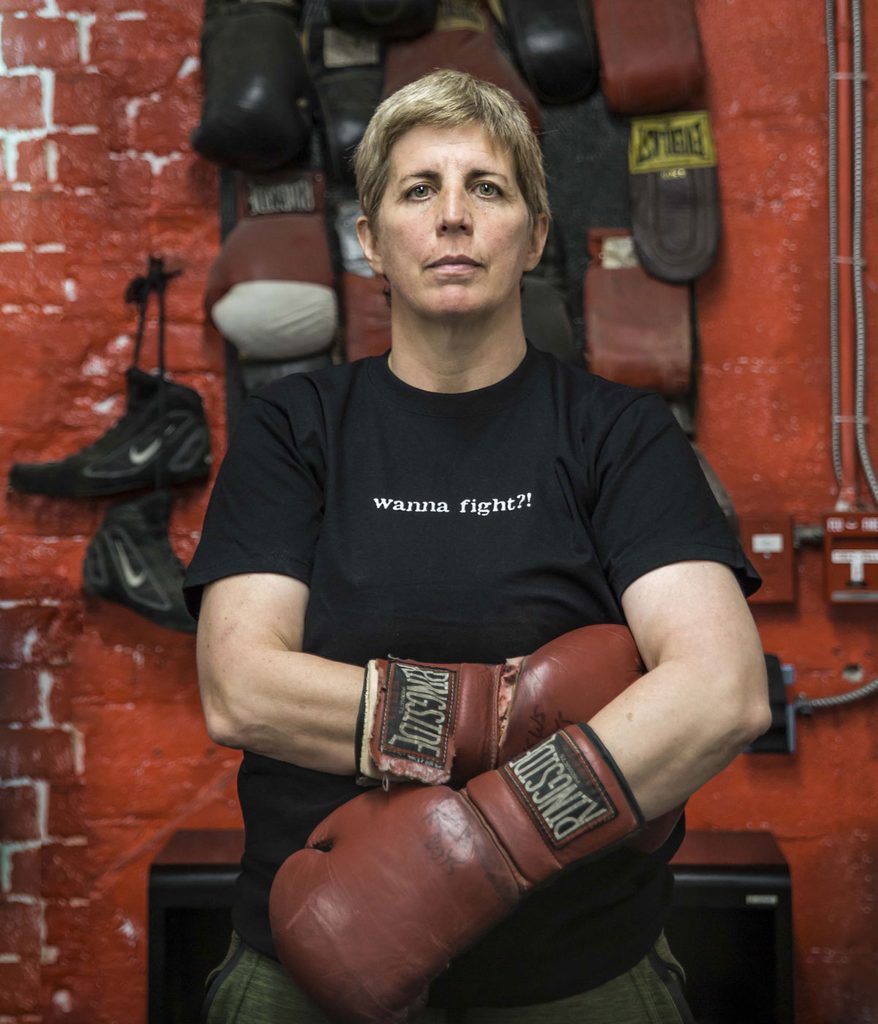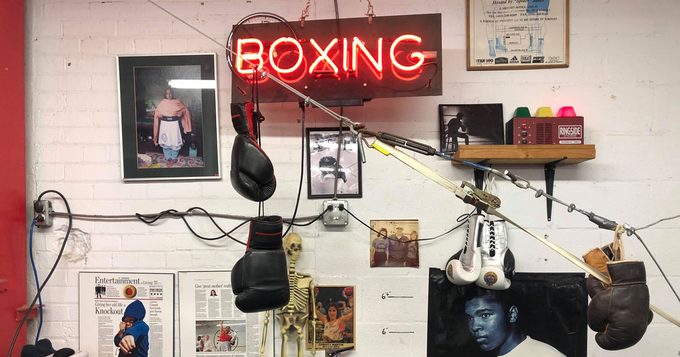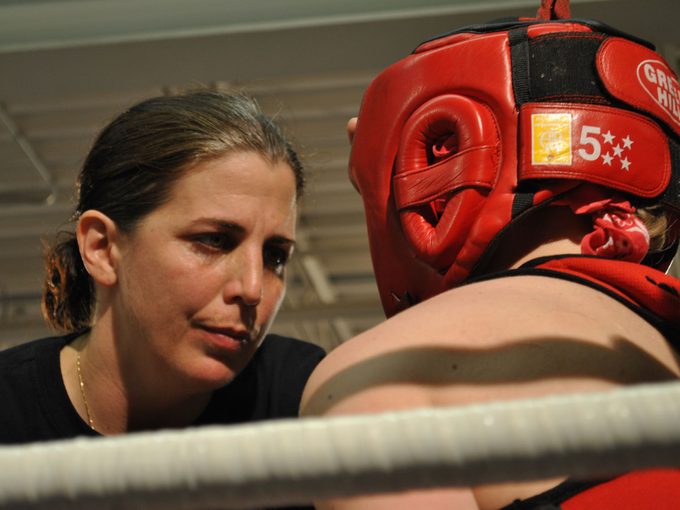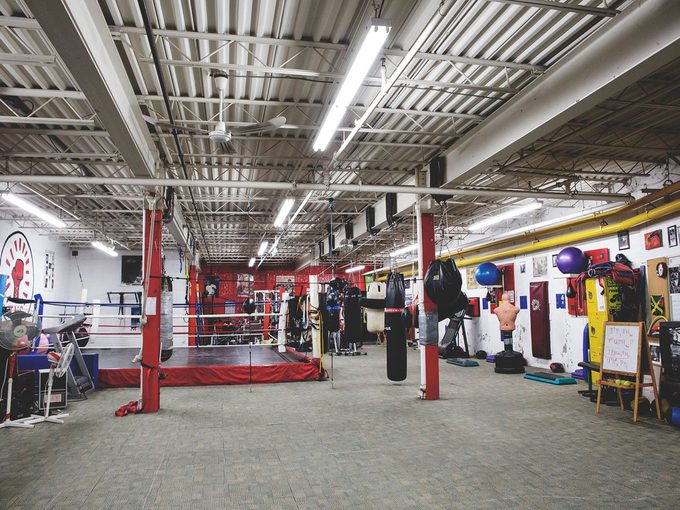Why This Toronto Boxing Gym — the First All-Female Club in Canada — Had To Close

Toronto Newsgirls Boxing Club became a haven for the LGBTQ+ community and survivors of domestic violence. Owner Savoy Howe explains why she had to shut it down, and what’s next.
Savoy Howe’s Toronto Newsgirls Boxing Club was born from her experiences in aggressive, male-dominated boxing gyms, but it was much more than just a place to work out. The club became known as a safe space for survivors of domestic violence and the LGBTQ+ community — a place where women-identifying members could realize their strength and speed bags were adjusted for people who used wheelchairs. For 24 years, Howe’s gym introduced boxing to people who may have been too intimidated to try it otherwise, and stood strong as other independent gyms came and went.
Then, the coronavirus pandemic hit and by summer, the club had to shut its doors; the mandated health protocols were nearly impossible to follow with indoor boxing. There was no way to make another month’s rent.
Howe and her boxers dismantled their celebrated ring and sold off equipment. They took the photos of members celebrating after a match down from the walls — which Howe says was “one of the hardest things to do.” But Howe, 54, doesn’t see this as a total KO. We spoke to her about the importance of inclusive fitness spaces, the strength that comes from community, and what she’s planning next.
First of all, how are you feeling?
“I got all my crying out. Twenty-four years is a long time. Once I decided that we were done, my shoulders dropped knowing that I didn’t have to come up with [thousands in rent] every month. So there was a lot of relief but at the same time, I knew I would miss the community 10 times more than that.”

When you founded Newsgirls in 1996, it was the first all-female boxing club in Canada. Why was starting an all-female club important to you?
“I started in a men’s club — the Toronto Newsboys Boxing Club — during a hard time in my life and I discovered the heavy bag; it was cheaper than therapy. Around my fourth year boxing, I put up a poster hoping to find a couple of women clients to train. I rented out space at the Toronto Newsboys club but only when the gym was closed, because when I shared the space with the boys, there was male aggression in the air. I knew that women probably wouldn’t want to come into that.
“After putting posters up on poles for about three months, about 40 women had come to a class. I thought, ‘Oh, wow. There’s something to this.’ I noticed that women carried themselves bigger in their bodies when they were in the gym without men around. We started having fun.”
But then your club evolved and you got your own space in 2006. How did it become a refuge for members of the trans and non-binary community?
“When some of my members started transitioning [to male], I started ‘everyone’ classes. Some people would say, ‘I don’t fit into any gender.’ So when somebody came in, I’d give them a 15-minute orientation and say, ‘There are many genders in here. A lot of people identify as “they.” Let us know your pronoun.’ It changed the whole vibe of the gym. Members knew that during certain time slots, all genders [were welcome], so people could choose whatever class they felt safe in.”

You also ran specific programs for survivors of violence. How did boxing help them?
“My coaching is trauma-informed. Unfortunately, in my experience, a lot of people are survivors of violence, including members from the LGBTQ+ community. Sometimes it takes a lot [of courage] for someone to even just get on the subway to get to class, but once they got here, they felt very safe. One of the most empowering things I noticed is when you teach someone how to punch properly, and you give them access to a heavy bag, you can see something switch. When we speak about it, people will say, “I had no idea I was that strong.” (Related: These are the strength training tips every woman needs to know.)
All your fighters have nicknames — and you are known as “Kapow!” Why are those so important?
“A nickname gives them an alter ego. One way I explain it is somebody could be having a terrible day, a terrible life, and be carrying a lot of baggage — as we all do. It’s almost like when you get to the club, you could leave your baggage at the door. You’re in this whole other world of positivity and laughter.”

What’s next for you? Do you have plans to reopen in a different space?
“We’re in the park training right now with some members that have stayed on and I have to say we’re having a blast. And it’s cheaper; I don’t have to pay for the trees. I haven’t had much time to think about what’s next, but I’m pretty optimistic. We have a really strong foundation that we can take into other spaces, like an LGBTQ+ resource centre. Maybe we won’t have a gym again, maybe we’ll rent space in another gym. Even though going out is hard, nothing can take away those 24 years.”
This interview has been condensed and edited for clarity.
Next: Learn the best physical activities for social distancing.




